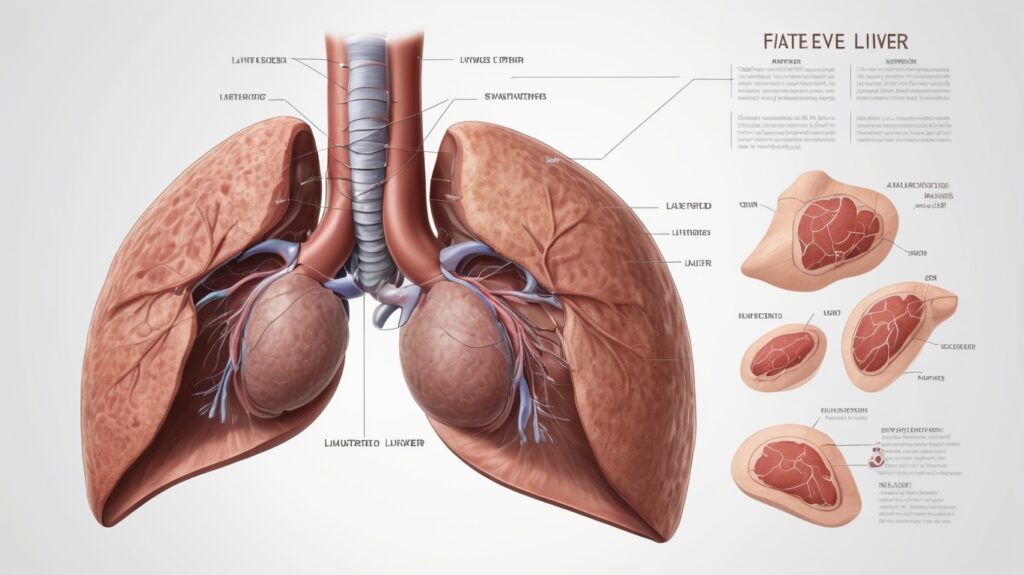Fatty liver disease, a condition where excess fat builds up in the liver, is increasingly common in today’s fast-paced world. It can lead to serious health complications if left unchecked, but the good news is that it can be reversed or managed through a proper diet. Our 21 days fatty liver diet plan is designed to help you detoxify your liver, reduce inflammation, and promote overall liver health. This comprehensive guide will walk you through every step of the plan, ensuring that you have the tools and knowledge to make lasting changes.
Table of Contents
Understanding Fatty Liver Disease
Before diving into the diet plan, it’s important to understand what fatty liver disease is and why it’s crucial to address it. There are two main types of fatty liver disease: Non-Alcoholic Fatty Liver Disease (NAFLD) and Alcoholic Fatty Liver Disease (AFLD). NAFLD is the more common type and is not caused by alcohol consumption. It is often associated with obesity, insulin resistance, and high cholesterol. AFLD, on the other hand, is directly linked to excessive alcohol intake.
The liver is a vital organ responsible for detoxifying the blood, producing bile for digestion, and storing energy. When fat accumulates in the liver, it disrupts these functions, leading to inflammation and scarring, a condition known as cirrhosis. Addressing fatty liver disease early with the right diet is key to preventing further damage.

The Foundation of the 21 Days Fatty Liver Diet Plan
Our 21 days fatty liver diet plan focuses on whole, nutrient-dense foods that support liver health while eliminating those that contribute to liver fat accumulation. The plan is divided into three phases: Detoxification, Repair, and Maintenance.
Phase 1: Detoxification (Days 1-7)
The first week of the plan is all about detoxifying the liver by eliminating foods that cause inflammation and introducing foods that support liver function.

Foods to Avoid:
- Sugar and Refined Carbohydrates: These contribute to insulin resistance and fat buildup in the liver. Avoid sweets, sugary drinks, white bread, and pastries.
- Processed Foods: High in unhealthy fats and additives, these can worsen liver inflammation.
- Alcohol: Even small amounts can damage liver cells and exacerbate fatty liver disease.
- Red Meat: High in saturated fats, which can lead to increased liver fat.
Foods to Include:
- Leafy Greens: Spinach, kale, and arugula are rich in antioxidants and fiber, which help reduce liver fat.
- Cruciferous Vegetables: Broccoli, cauliflower, and Brussels sprouts contain compounds that enhance liver detoxification.
- Berries: Blueberries, strawberries, and raspberries are loaded with antioxidants that protect the liver from damage.
- Garlic: Known for its ability to activate liver enzymes that help flush out toxins.

Sample Meal Plan for Detoxification Phase 1:
| Breakfast | Smoothie with spinach, blueberries, almond milk, and flaxseeds. |
| Lunch | Salad with mixed greens, grilled chicken, avocado, and a lemon vinaigrette. |
| Dinner | Baked salmon with steamed broccoli and quinoa. |
| Snacks | Carrot sticks with hummus, apple slices with almond butter. |
Phase 2: Repair (Days 8-14)
In the second week, the focus shifts to repairing liver cells and reducing inflammation. This phase includes foods that are rich in healthy fats, antioxidants, and fiber.

Key Foods:
- Omega-3 Rich Foods: Salmon, sardines, and flaxseeds help reduce liver fat and inflammation.
- Nuts and Seeds: Walnuts, chia seeds, and sunflower seeds provide essential fatty acids and antioxidants.
- Whole Grains: Oats, brown rice, and quinoa support liver function with their high fiber content.
- Olive Oil: A healthy fat that has been shown to improve liver enzyme levels and reduce liver fat.

Sample Meal Plan for Repair Phase 2:
| Breakfast | Oatmeal with chia seeds, walnuts, and a drizzle of honey. |
| Lunch | Quinoa salad with cherry tomatoes, cucumber, olives, and feta cheese. |
| Dinner | Grilled sardines with roasted sweet potatoes and sautéed spinach. |
| Snacks | Greek yogurt with flaxseeds, a handful of almonds. |
Phase 3: Maintenance (Days 15-21)
The final phase is about maintaining the gains achieved in the first two weeks. It focuses on a balanced diet that keeps the liver healthy long-term.
Key Foods:
- Lean Proteins: Chicken, turkey, and tofu provide the building blocks for liver repair without adding excess fat.
- Colorful Vegetables: A variety of vegetables ensures a wide range of nutrients that support overall health.
- Low-Glycemic Fruits: Apples, pears, and oranges are low in sugar and high in fiber, making them perfect for maintaining liver health.
- Herbs and Spices: Turmeric, ginger, and cinnamon are anti-inflammatory and support liver function.

Sample Meal Plan for Maintenance Phase 3
| Breakfast | Scrambled eggs with spinach and a side of fresh fruit. |
| Lunch | Turkey and avocado wrap with whole-grain tortilla and a side of mixed greens. |
| Snacks | Celery sticks with peanut butter, a pear. |
| Dinner | Stir-fry with tofu, bell peppers, broccoli, and brown rice |
Lifestyle Tips for Supporting Liver Health
While diet is crucial, lifestyle changes also play a significant role in reversing fatty liver disease. Incorporate the following habits into your routine for optimal results:
Regular Exercise:
Engage in at least 30 minutes of moderate exercise, such as brisk walking or cycling, most days of the week. Exercise helps reduce liver fat and improves overall metabolism.
Stay Hydrated:
Drink plenty of water throughout the day to help the liver flush out toxins and stay hydrated.
Manage Stress:
Chronic stress can negatively impact liver function. Practice stress-reducing techniques like meditation, deep breathing, or yoga.
Get Enough Sleep:
Aim for 7-9 hours of quality sleep each night to support overall health and allow the liver to perform its detoxifying functions effectively.

Conclusion: The Power of a 21 Days Fatty Liver Diet Plan
The 21 days fatty liver diet plan is a comprehensive approach to reversing fatty liver disease and promoting overall liver health. By following the three phases—Detoxification, Repair, and Maintenance—you can reduce liver fat, lower inflammation, and enhance liver function. Combined with a healthy lifestyle, this diet plan is a powerful tool in the fight against fatty liver disease.
What Is the Best Diet for Someone with PCOS?
PCOS Yoga: Incredible Power of Yoga
Yoga-go.io genuine review
7 kirtan kriya benefits Incredible
Somatic Yoga Exercises PDF
50+ Printable Chair exercises for seniors
Horse Yoga Pose Step-by-Step
Dangers of Yin Yoga for People with (Osteoporosis)
Is kirtan kriya dangerous
20+ Spiritual Dangers of Yoga
Top 10 Somatic Yoga Exercises
20+ Hot Yin Yoga Essential Poses
What is Yin Yang Yoga
10+ Kundalini Yoga Kriyas
